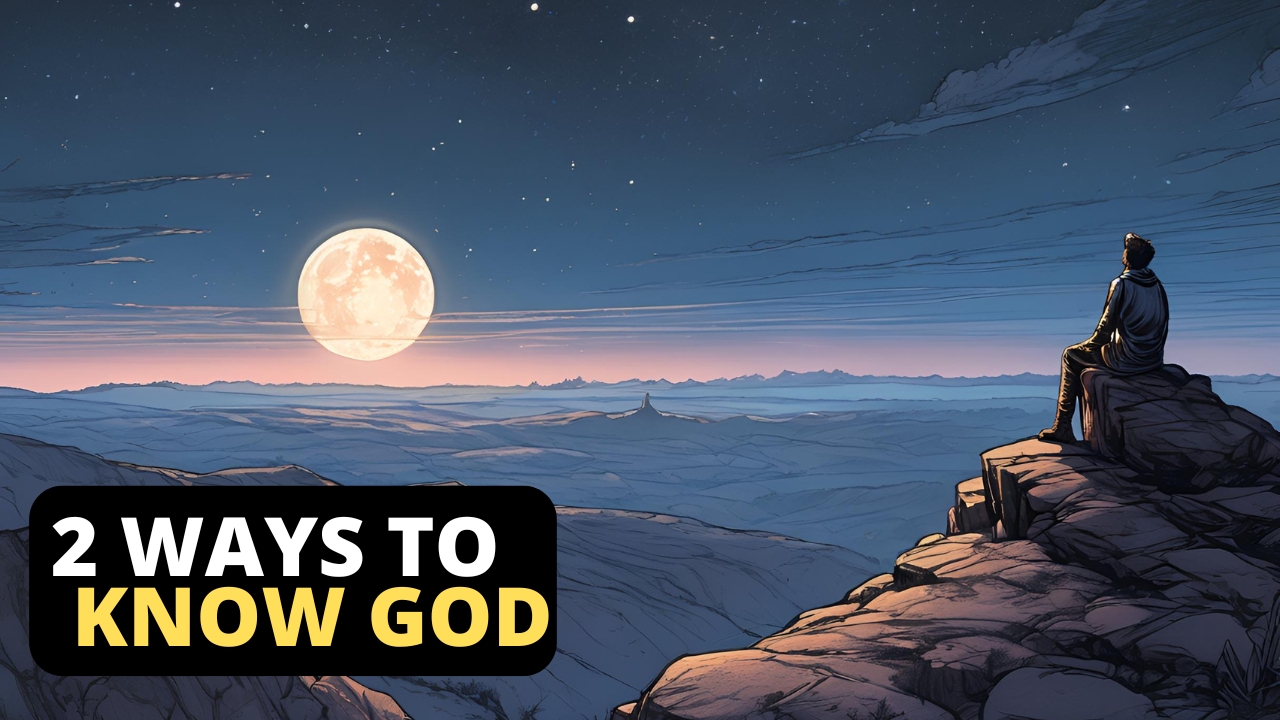The Only Two Ways to Learn About God

Did you know that there are only two ways that you can learn about God?
If you want to learn more about who God is and what he has done, there are only two ways we can do it.
1. Natural Revelation
The first way to learn about God is natural revelation. We can learn about God by observing what he has revealed about himself in the natural world he created.
We can observe that he is a God of order. He is a vast and immeasurable. He is powerful.
We can even observe that he is good and moral because every human has a sense of morality written in their heart. We know instinctively that murdering an innocent person so that we can steal from them is wrong.
Psalm 19 talks about both of these ways of learning, starting with natural revelation.
Psalm 19:1–6 says, “The heavens declare the glory of God, and the sky above proclaims his handiwork. 2 Day to day pours out speech, and night to night reveals knowledge. 3 There is no speech, nor are there words, whose voice is not heard. 4 Their voice goes out through all the earth, and their words to the end of the world. In them he has set a tent for the sun, 5 which comes out like a bridegroom leaving his chamber, and, like a strong man, runs its course with joy. 6 Its rising is from the end of the heavens, and its circuit to the end of them, and there is nothing hidden from its heat” (ESV).
We see evidence in nature that all humans know the existence of God in the simple fact that every human society from the beginning of time has worshipped some form of a god. Every human society has had some form of moral code of ethics.
They may not all agree on who god is or how many gods exist, but they all agree that there has to be a greater being than us who created everything.
But we can only learn so much about God from nature. We have evidence of God’s existence, but it’s like trying to know about someone only by looking at their house and never speaking to them.
If you walked into my house, you could learn whether I am an orderly or messy person just by looking around. You may be able to learn some about what I value by what I place in a position of prominence or have framed on my walls. But the extent of your knowledge of me will be insufficient.
Why? Because you learn far more about a person by what they reveal when they speak and how they act.
Natural revelation is not sufficient by itself. That leads us to the second way we can learn about God.
2. Special Revelation
The second way to learn about God is often called special revelation.
Special revelation is when God speaks or reveals himself to us in unnatural (miraculous or divine) ways. It is a supernatural revelation, coming outside of nature from God himself.
The Bible contains special revelation. God has revealed himself to us through the writings of human authors inspired by the Holy Spirit. They have recorded monumental times when God acted miraculously and spoke to and through the prophets, apostles, angels, and Jesus Christ.
After addressing how we see God in his creation (natural revelation), Psalm 19 continues with God’s special revelation in the Bible.
Psalm 19:7–11 says, “The law of the Lord is perfect, reviving the soul; the testimony of the Lord is sure, making wise the simple; 8 the precepts of the Lord are right, rejoicing the heart; the commandment of the Lord is pure, enlightening the eyes; 9 the fear of the Lord is clean, enduring forever; the rules of the Lord are true, and righteous altogether. 10 More to be desired are they than gold, even much fine gold; sweeter also than honey and drippings of the honeycomb. 11 Moreover, by them is your servant warned; in keeping them there is great reward.”
God’s laws, precepts, and testimony are what we have today in the Bible. The Bible is perfect. It makes simple people wise. It is right. It is pure. It helps us see more clearly. It does not change. It will endure forever. And it is more precious than gold. What an incredible promise. If this is true, then there’s nothing better.
The Bible teaches us far more about God’s nature, will, and moral laws that he commands us to obey. It is through the Bible that we learn about the destructive nature of sin, our desperate need for salvation, and God’s redemptive plan to save us through Jesus’ death and resurrection.
Since we can only know God so much through his creation, God chose to reveal himself to his people. He inspired the writers and prophets, speaking through them. And he still speaks to us today through his Word.
2 Timothy 3:16–17 says, “All Scripture is breathed out by God and profitable for teaching, for reproof, for correction, and for training in righteousness, 17 that the man of God may be complete, equipped for every good work.”
So if you want to be complete and equipped for every good work, what do you need? The Bible. What else? That’s it.
The Bible is sufficient for everything God needs us to know in order to follow him fully.
If a fire burned my church’s buildings to the ground tonight and we had nothing left but a Bible, we would still have all that we need. While buildings are nice, and AC is a luxury, all you need is the Bible.
Other books written by theologians and pastors across the ages are helpful, but they are all nothing compared to the Bible. We don’t need to run to any other source except THE SOURCE of Scripture. The Bible alone is sufficient.
This idea was coined after the Protestant Reformation as Sola Scriptura, Latin for “Scripture alone.” It means that Scripture alone is our final authority.
We don’t blindly take orders from any pope, pastor, prince, or politician. Like the Bereans, we should test everything others teach by the Bible to guide and instruct us.
Church tradition and history is valuable and helpful—and many churches have gone too far by never talking about it—but we should always evaluate all that we believe and do under the ultimate authority of Scripture.
Many other books by Christian authors are good and helpful, but they aren’t even close to the same level of authority as Scripture.
Why would we want to take the authority of any man’s word over God’s Word?
If there is anything we have learned over the course of human history, it is that all people are imperfect and capable of grave mistakes. So I’ll take God’s inerrant Word over man’s errant words every time.
The Bible is our final source of authority for all of our beliefs and all of our practices as Christians.
We can learn about God from the natural world, but we’ll only ever know him fully through what he has revealed through his Word.






